-
 Art of Wellness Acupuncture & Traditional Chinese Medicine (TCM)11704 Wilshire Blvd, Suite 295, Los Angeles, CA, 90025
Art of Wellness Acupuncture & Traditional Chinese Medicine (TCM)11704 Wilshire Blvd, Suite 295, Los Angeles, CA, 90025
myartofwellness@gmail.com310-451-5522 Office Hours
MonClosedTue7:30 am --4 pmWed7:30 am --4 pmThu7:30 am -- 4 pmFri7:30 am -- 4 pmSat7:30 am -- 4 pmSunClosedOur office opens from Tuesdays to Saturdays 7:30 am to 4 pm, will be closed on Memorial day, Independent day, Labor day, Thanksgiving day, Christmas and New year.
-
Recent Posts
- Acupuncture for Sciatica Pain
- Can Acupuncture Help With Bladder Control?
- How to Treat De Quervain’s Tenosynovitis With Acupuncture and TCM
- Chinese New Year 2026: Year of the Horse
- Acupuncture and TCM Treatment for Perimenopause Symptoms
- How to Treat Insulin Resistance With Acupuncture and TCM
- How to Treat Metabolic Syndrome With Acupuncture and TCM
- How to Treat Syncope With Acupuncture and TCM
- How to Treat Thoracic Outlet Syndrome With Acupuncture and TCM
- How to Treat Dupuytren’s Contracture With Acupuncture and TCM
- How to Treat Nutcracker Syndrome With Acupuncture and TCM
- How to Treat Rosacea With Acupuncture and TCM
- How to Treat Perioral Dermatitis With Acupuncture and TCM
- Lymphatic Drainage With Acupuncture and TCM
- How to Treat Turf Toe With Acupuncture
- How to Treat Nerve Pain With Acupuncture and TCM
- Sign up to receive news and updates and get my free report:“The Top 10 Reasons to Try Acupuncture”

February 2026 M T W T F S S 1 2 3 4 5 6 7 8 9 10 11 12 13 14 15 16 17 18 19 20 21 22 23 24 25 26 27 28
Liver
How to Treat Glaucoma With Acupuncture and TCM
By Qineng Tan, L.Ac., Ph.D. & Xiaomei Cai, L.Ac., Ph.D.

Dry eyes, blurred vision, or a headache behind eyes? Eye pain, redness, or pressure behind eye should not be ignored, as these symptoms may be a sign of deeper issues. Acupuncture and TCM offer an effective and holistic way to treat glaucoma, eye pain and headache, dry eye syndrome, and blurry vision in one eye or both eyes.
As a delicate organ that holds itself together in an orb shape, the eye requires the right amount of fluid to maintain tension and to keep its surface moist. Many eye problems are related to the balance, or imbalance, of fluids in and around the eyeball. Tears keep the eyeball lubricated, while a liquid called aqueous humor keeps the eyeball inflated. When there is not enough fluid, or when the fluid doesn’t drain properly and builds up in the eye, it can lead to eye disorders like dry eye and glaucoma.
TCM treatment for eye disorders work well as an alternative or adjunct to standard treatments for glaucoma or dry eye disease, as they focus on addressing the internal, root causes of these common eye issues.
What Causes Dry Eyes?
One of the most common eye problems is dry eye disease, which happens when you don’t produce enough tears, or if the tears you do produce don’t lubricate the eyes enough. Tears are made up of water, oil, and mucus. If the glands that produce tears are not functioning correctly, and/or the balance of water, oil, and mucus is not right, the tears may not protect the surface of the eyeball the way they’re supposed to.
The symptoms of dry eye syndrome include:
- Burning eyes, stinging eyes
- Thick, stringy mucus in the eyes or around the eye
- Extra sensitivity to light
- Red eyes, eye redness
- Watery eyes, watering eyes as reaction to dryness
- Eyes itching, rubbing eyes, feeling like there is something gritty or sand in your eye
- Blurred vision, blurry eyes, blurry vision in one eye, sudden blurry vision
- Eye fatigue, eyes tired when reading or looking at screens, eyelids feel heavy
- Difficulty driving at night
- Difficulty wearing contacts
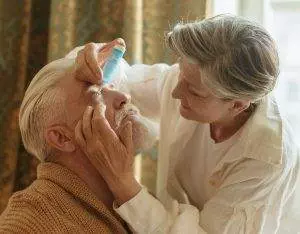
Dry eyes can be caused by many different factors, from weather, environment, or humidity levels in your home or office, to allergies, hormones, medications like antihistamines, decongestants, birth control pills, antidepressants, and medications prescribed for high blood pressure and Parkinson’s disease. Some people may have dry eye after having LASIK eye surgery, or because of wearing contacts, or staring too long at their computer. Some health conditions that put you at higher risk for dry eye syndrome include: rheumatoid arthritis, ALS, lupus, and hyperthyroidism. Dry eyes can become inflamed, and make you more susceptible to infections. Over time, dry eye syndrome can lead to scarring of the cornea, which can permanently affect vision.
The typical treatment most people try for dry eye syndrome is the use of over the counter eye drops or artificial tears. There are various types of prescription medications that also aim to replace or increase the production of tears. Some doctors may recommend antibiotics to help reduce inflammation around the tear ducts, or special contact lenses that are designed to keep moisture on the surface of the eye. But none of these solutions treats the underlying cause of dry eyes.
Acupuncture has been shown to boost the efficacy of standard treatment for dry eyes by helping promote more tear secretion and improving the makeup of the tears themselves, so that they don’t evaporate so easily.
What Is Glaucoma?
Glaucoma is an umbrella term for vision loss related to damage to the optic nerve. This often happens because of a buildup of too much fluid in the eye, which creates pressure. Often, a person has already had glaucoma for a long time before they begin to notice changes in their vision. The most common types of glaucoma do not cause eye pain but can cause loss of vision, usually beginning with peripheral vision.
Glaucoma is one of the top causes of blindness worldwide, and can begin at any time in life. African Americans have a much higher risk of developing glaucoma. Other people at higher risk for glaucoma include people over 60, people who have diabetes, and people who are already very near-sighted.
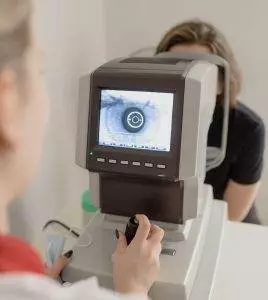
The most common type of glaucoma is primary open-angle glaucoma (POAG), which is diagnosed when an eye examination finds damage to the optic nerve or retinal nerves. Most people with POAG demonstrate some level of elevated intraocular pressure, but some do not. Most types of treatment for glaucoma are focused on reducing this eye pressure, as it is one known factor. However, medical science is still unclear about exactly what causes glaucoma.
Medications to treat glaucoma try to remove the excess pressure built up in the eye by either increasing the flow of fluid out of the eye, or by decreasing the production of fluid within the eye. Combination medications do both. These medications may or may not be helpful for individual patients. For some people, they cause irritation or dry eyes (see above). They require frequent usage and can be expensive. Laser surgery is another alternative, but many patients begin having problems with eye pressure again after some time has passed.
Acupuncture treatment can improve blood flow to the eye and to the optic nerve, which can in turn help to reduce pressure behind the eye.
Acupuncture: A Natural Treatment for Dry Eye and Glaucoma
According to TCM, many eye disorders reflect other problems going on internally, dimming the life force energy that lights up the eyes. From the TCM point of view, eye problems like glaucoma and dry eye syndrome are due to lack of proper flow of energy, blood, and nourishment to the eyes.
In TCM, the liver is considered the storehouse and distributor of blood and other bodily fluids. If there is inadequate production of tears in the eyes, that is considered to be a reflection of some weakness or blockage coming from the liver system. The liver also contains the “spark of life” that shines out through the eyes. So, when there is not enough blood and Qi flowing from the liver to the eyes, there may be dryness and blurred vision. When there is too much fire energy coming from the liver, it can cause swelling that leads to pressure. This is what can cause the eye pressure of glaucoma, and also eye pain, or headache behind the eye.
Research has shown that acupuncture treatment can be effective for helping both glaucoma and dry eye syndrome:
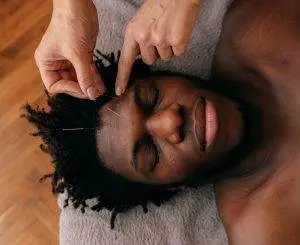
- One study of patients treated for glaucoma showed reduced intraocular pressure both an hour after the treatment, and more generally, after having completed four treatment sessions.
- An analysis of studies showed that patients treated with acupuncture for glaucoma showed improved vision over those who did not.
- Another study showed that acupuncture treatment for glaucoma improved blood flow to the eye.
- A study done at the University of Pittsburgh compared patients treated with acupuncture for dry eye to those given “sham” acupuncture treatments over a six month period. Participants who had acupuncture reported improvement in symptoms of dry eye, such as less scratchiness and less redness. The results were still improved months after the treatment.
- A study that compared patients who received acupuncture treatment and used artificial tears to those who only used artificial tears found that the acupuncture recipients produced more natural tears of good quality, and experienced fewer symptoms of dryness.
Acupuncture Near Me for Glaucoma and Other Eye Disorders – Los Angeles Area
TCM has recognized and treated eye disorders for many centuries. Symptoms of dryness, itching, eye fatigue, pressure or headache behind eyes, and sore eyes can all be treated with acupuncture and herbs. Some changes in habits and nutrition will go even further to help people with glaucoma or dry eyes find relief. The doctors at Art of Wellness have over 35 years of experience in helping people get relief from dry eyes, restoring clearer vision, and bringing back the vibrant Qi that lights up your eyes.
*This article is for education from the perspective of Traditional Chinese Medicine only. The education provided by this article is not approved by FDA to diagnose, prevent, treat and cure human diseases. It should not stop you from consulting with your physician for your medical conditions. Traditional Chinese Medicine is based on Qi, which is an invisible force that usually cannot be observed by modern science. Because science focuses on testing ideas about the natural world with evidence obtained through observation, these aspects of acupuncture can’t be studied by science. Therefore acupuncture and Chinese herbs are often not supported by double-blind, randomized trials, and they are considered alternative medicine therapies in the United States.
How to Treat Seizures With Acupuncture and TCM
By Qineng Tan, L.Ac., Ph.D. & Xiaomei Cai, L.Ac., Ph.D.

Sudden loss of consciousness, convulsions or jerking body parts, staring, feelings of fear, anxiety, deja vu? These are all possible signs of seizure. Epilepsy is a chronic neurological disorder that causes different types of seizures. Research has shown that acupuncture and TCM treatment for epileptic seizures can be an effective adjunct to conventional treatment.
Epilepsy is a common disease of the central nervous system that can happen to people of all ages. Epilepsy is a term that can refer to a variety of different types of seizures; it defines a condition in which a person has recurrent seizures. Over 3 million people in the U.S. have been diagnosed with epilepsy; it is one of the most common neurological disorders worldwide.
What is the cause of seizures? Unusual electrical activity in brain cells can cause various types of seizures, depending on what area of the brain is affected. In some cases, people begin to have seizures due to a head injury, or a brain infection, such as meningitis. Some people seem to be born with an unusual brain structure that affects the area of the brain that causes seizures. In older people, symptoms of epilepsy may coexist with those of other neurological conditions, such as Alzheimer’s disease, or seizures may start occurring as an effect of having suffered a stroke or heart attack. Seizures can be caused by an allergic reaction to some food, as when a person with Celiac disease is exposed to gluten. Medical science has not yet discovered the exact meaning of seizures that occur in other cases, but it is thought to be due to genetics.
People with epilepsy need treatment to try to prevent or reduce seizures. While some seizures are mild, others can be severe, and even life-threatening. TCM has been using acupuncture treatment and herbs to help seizures for many, many years, and recent research is beginning to demonstrate how TCM as integrative care for epilepsy can be beneficial.
What Happens During a Seizure?
The signs of seizure can vary widely from person to person, but an individual’s specific pattern of what seizures look like will usually remain consistent.
Symptoms of seizure include:
- A range of changes in awareness: from staring and being unresponsive, up to totally losing consciousness
- Stiffening of the limbs, limbs twitching, or part of the body shaking
- Changes in vision: double vision, seeing flashes of light, staring, or blinking repeatedly
- Dizziness, sudden headache
- Sweating, nausea
- Having trouble breathing, or stop breathing
- Falling down for no apparent reason, sudden collapse, head nodding, muscles go limp, sometimes called “drop attacks”
- Loss of bladder or bowel control
- Feelings of anxiety, panic attack, fear
- Sense of having an “out of body” experience
- Strange taste in mouth or smelling strange smells
- Feelings of confusion
- Drooling or frothing at the mouth, biting tongue or inside of cheeks
- After the seizure, a person may feel exhausted, or have amnesia, trouble remembering what happened.
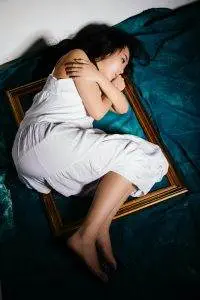
Historically, there have been many misconceptions about people who suffer from seizures, or “fits disease.” When a person is not having a seizure, they are usually otherwise healthy and capable. People with epilepsy are not necessarily limited in what they can do physically or mentally–except when they are having a seizure–,unless they have other chronic health problems in addition to epilepsy.
If you see someone having a seizure, DO stay near them and make sure they are safe. If they fall or seem to be unconscious, turn them onto their side and make sure they are breathing. DO NOT try to physically restrain a person who is having a seizure or attempt to put anything in their mouth. The idea that a person might swallow their tongue while having a seizure is a myth.
Top 10 Types of Seizures
There are many types of seizures. Sometimes a person has one one seizure caused by medication, drug withdrawal, illness, or some sort of trauma to the brain. A person may have a seizure due to an allergic reaction to some kind of medication or food. Experiencing one seizure does not mean a person is epileptic. Epilepsy is only diagnosed if a person has multiple seizures over time.
Seizures are divided into two main categories: focal onset or generalized onset. “Focal” refers to a seizure that originates from a localized part of one of the hemispheres of the brain. “Generalized” means that there is seizure-causing activity happening all over, or on both sides of the brain.
Specific types of seizure include:
- Focal Seizure with Retained Awareness – Or, “focal onset aware seizure.” Used to be known as a “simple partial seizure” or “partial seizures.” These are usually short in duration (less than 2 minutes) and a person remains conscious and aware while it is happening, although they may not be able to respond to people around them, or they seem “frozen.” The specific feelings vary widely: a sense of deja vu, sense of pressure or anxiety, a strange, overpowering smell, etc.
- Focal Onset Impaired Awareness seizure – also used to be called “complex partial seizures,” “temporal lobe seizures,” or “psychomotor seizures.” In this type of seizure, the person loses awareness of their surroundings. They may seem to be staring, zoning out, picking at their clothing, wandering aimlessly, smacking their lips, or making grunting sounds. These, too, are short in duration, and afterwards, the person may feel confused and very sleepy.
- Febrile seizures – these are seizures that are caused by having a fever over 100 degrees, usually as a result of having some type of infection, like a flu. Febrile seizure happens in young children; they may have shaking all over or jerking limbs, convulsions, or lose consciousness. Occasionally children may have febrile seizures in response to having a fever after receiving a vaccination. Febrile seizures do not cause brain damage or indicate a neurological disorder; they do not mean a person has epilepsy.
-

An absence seizure can last just a few seconds. Absence Seizure – used to be called “petit mal seizure.” This is a type of generalized onset seizure in which a person briefly loses awareness, or “blanks out” for just a matter of seconds. They are caused by abnormal brain activity, possibly related to hyperventilation. Absence seizures are more common in children, who may outgrow this disorder.
- Myoclonic Seizure – this is a very short kind of seizure that causes muscles to jerk or twitch for just a few seconds. “Myo” means muscle, and “clonus” means contraction and relaxation. These can happen to people with epilepsy, but myoclonic seizures can also happen to anyone. That feeling of being jerked awake and having a spasm in your legs when you are falling asleep is a kind of myoclonus.
- Tonic Clonic Seizure – this used to be known as “grand mal seizure.” This is the type of seizure that causes convulsions, stiff arms and legs, shaking all over, and other symptoms such as losing bladder control, crying out or making strange sounds, losing consciousness, and falling to the ground. A person who has experienced tonic clonic seizures before may notice an “aura” before the more severe symptoms of seizure begin; this might include a sense of vertigo, dizziness, nausea, feelings of anxiety, or strange smells or a weird taste in the mouth. Tonic clonic seizures may last a few minutes, and the person may be exhausted and emotional afterwards.
- Refractory Seizures or Uncontrolled Seizures – also called “drug-resistant” or “intractable” seizures, this is when a person has frequent and/or severe seizures that do not respond to medical therapy such as anti-epileptic medications.
- Lennox Gastaut Syndrome (LGS) – LGS is a rare form of epilepsy that shows up very early in life, usually when a child is still in infancy. Lennox Gastaut causes various kinds of seizures, both tonic (muscle spasms) and atonic (staring, still), or absence seizures. Children with LGS may experience multiple seizures per day, and have learning delays due to cognitive dysfunction.The cause of LGS is sometimes unknown, but it can be due to abnormal brain development, or a baby having some type of infection or loss of oxygen in utero, before they’re born.
- West Syndrome – also called “infantile spasms,” this is a type of epilepsy in young children that causes spasms and unusual movements for a baby, like throwing out of the arms, straightening the arms out to the sides, knees pulled up to the chest, the upper body bending forward, or head thrown back. West syndrome seizures only last a few seconds, and they usually go away by the time a child is past toddler years.
- Status epilepticus – This is a neurological emergency condition in which abnormal brain activity causes a prolonged seizure that lasts longer than five minutes, or multiple seizures that occur back-to-back without recovery in between. This can happen to a person who has epilepsy, or it can happen due to trauma, such as a head injury, or a hypertensive (high blood pressure) situation, or a severe reaction to drug toxicity, or an autoimmune disease response. There could be motor symptoms of shaking and collapsing, or the person could just be staring and unresponsive, depending on where the disordered activity is happening in the brain. Status epilepticus is a true medical emergency, and a person needs immediate attention to prevent brain damage.
Medical Treatment for Epileptic Seizures
Conventional treatment for seizures usually involves medications known as anticonvulsants (anticonvulsive), or anti-seizure medications. First, it is necessary for doctors to accurately diagnose the problem: what type of seizures is a person having, and what is causing them? Some drugs help to stop seizures from happening in the short term. Tranquilizers like Valium (Diazepam), Ativan (Lorazepam), and Klonopin may help to stop a seizure while it is happening, but people build up a tolerance quickly to these medications and then have to take higher doses to get the same effect. Other medications, like Aptiom, are taken daily to prevent seizures. There are many other medications used to treat different types of epilepsy, but these medications only work to control seizures in some cases. Other people may struggle to find a medication they can tolerate. Anticonvulsants and other anti-epileptic drugs can cause side effects like weakness, dizziness, headaches, nausea or vomiting, and skin rash.
People who experience seizures do need treatment to control epileptic symptoms, but it can be challenging to find the right combination of therapies. Acupuncture and TCM treatment offer an alternative treatment that may help to control seizures without negative side effects.
Can Acupuncture Help Epilepsy Symptoms?

TCM has a long history–over 2000 years–of helping people who have epileptic seizures. The first documentation of acupuncture treatment for seizures by TCM practitioners was written at least 200 years B.C.. Specific Chinese herbs to treat epilepsy have been used for many centuries, and are now being studied through scientific research to prove their efficacy. Several studies have shown that various herbal formulations help to reduce the frequency of seizures.
Data also show that acupuncture treatment can help alleviate symptoms of epilepsy, reducing the occurrence of seizures through its positive effect on neurotransmitters in the brain.
According to TCM theory, epilepsy usually arises due to problems with the Liver system. Too much Wind affecting the Liver can cause spasms or convulsions. Liver Yang Rising can lead to muscle twitching and/or dizziness. An acupuncturist will use a combination of modalities such as acupuncture treatment, electro-acupuncture, Chinese herbs, and therapeutic massage to help seizures.
As with so many health conditions, inflammation plays a role in epileptic seizures. Auricular acupuncture (ear acupuncture) and electro-acupuncture (electro-stim) may have an anti-inflammatory effect on the brain that helps to reduce the frequency of seizures.
TCM theory posits that stimulation of specific acupressure points (such as “Shenmen” points on head or ear) for epilepsy can help to calm the mind and produce a positive effect on the parasympathetic nervous system.
A recent study compared patients who received the standard medication therapy for epilepsy with those who had acupuncture treatments for 12 weeks in addition to drug therapy. At a one year follow up, the patients who had received acupuncture for seizures had a statistically significant improvement of their epilepsy symptoms compared with patients who had received only the conventional medical treatment.
Acupuncture Near Me for Epileptic Seizures Los Angeles Area
It is challenging to manage seizures, but it is possible for people with epilepsy to live a long and healthy life with minimal disruptions. Living with a chronic and unpredictable health condition like epileptic seizures can cause emotional suffering in addition to physical symptoms. The holistic approach provided by TCM and acupuncture treatment can be considered as a safe form of complementary alternative medicine for epilepsy.
*This article is for education from the perspective of Traditional Chinese Medicine only. The education provided by this article is not approved by FDA to diagnose, prevent, treat and cure human diseases. It should not stop you from consulting with your physician for your medical conditions. Traditional Chinese Medicine is based on Qi, which is an invisible force that usually cannot be observed by modern science. Because science focuses on testing ideas about the natural world with evidence obtained through observation, these aspects of acupuncture can’t be studied by science. Therefore acupuncture and Chinese herbs are often not supported by double-blind, randomized trials, and they are considered alternative medicine therapies in the United States.
How to Treat Hepatitis With Acupuncture and TCM
Qineng Tan, L.Ac., Ph.D. & Xiaomei Cai, L.Ac., Ph.D.

Fever, fatigue, abdominal pain, jaundice, dark urine–these are possible signs of Hepatitis infection, although many people infected with Hepatitis show no symptoms. For some people, a Hepatitis B or Hepatitis C infection goes away on its own, but in other cases, it can cause serious liver damage, leading to chronic liver disease. Acupuncture and TCM treatment, including Chinese herbs, offer a way to help improve liver function and reduce symptoms of Hepatitis.
There are several variants of the Hepatitis virus that can cause inflammation of the liver, leading to scarring (liver cirrhosis or liver fibrosis), and in some cases leading to chronic liver problems or liver cancer. Hepatitis B (HBV) and Hep C (HCV) are the types of infection that can lead to long-term illness and even liver failure. It is estimated that over 300 million people worldwide are living with the effects of HBV or HCV infections.
There is a vaccination that offers protection against Hepatitis B and Hepatitis A, but there is no vaccine for Hepatitis types C, D, and E. People who have contracted Hepatitis A or an acute form of HBV are usually told to rest and drink lots of fluids. Medical treatment for chronic Hepatitis that lasts for more than six months usually involves antiviral medications that help slow down the spread of the virus through the body. TCM treatment for Hepatitis with acupuncture and herbs works to improve the function of the liver and related organs (spleen, kidneys, gallbladder) and to strengthen the immune system so that the body can overcome the effects of the Hepatitis virus.
What Causes Hepatitis?
There are currently five different types of Hepatitis infection, referred to as: Hepatitis A, Hepatitis B virus (HBV), Hepatitis C (HCV or Hep C), Hepatitis D, and Hepatitis E.
All of these viral infections affect the liver, causing inflammation and possibly scarring, known as cirrhosis of the liver or fibrosis of the liver.

Hepatitis A and E viruses are carried in contaminated water or food supplies. People might contract the Hep A or Hep E virus through eating something like raw shellfish that was in contaminated water, or eating food prepared by a worker who did not wash their hands properly. These variants of Hepatitis may cause an acute infection, but do not lead to chronic conditions.
HBV and HCV are spread through bodily fluids like blood and semen, and can therefore be spread through sexual contact, or the sharing of needles, or a woman may pass the infection to her baby during birth. Hepatitis is a common co-infection in people living with HIV/AIDS. People with Cystic Fibrosis (CF) can also be more prone to infections and liver problems. These more serious forms of Hepatitis can lead to chronic illness, including cancer of the liver, or liver failure, making it one of the primary reasons people end up having a liver transplant.
Autoimmune hepatitis, which has also been called plasma cell hepatitis or lupoid hepatitis, occurs when the immune system mistakenly attacks liver cells.
Top 10 Symptoms of Hepatitis
Symptoms of a HBV or Hepatitis C infection often do not show up for a few weeks, a few months, or in some cases, years later. Some people, especially children, do not feel any symptoms of Hepatitis. The most common Hepatitis symptoms include:
- Abdominal pain, pain in right side
- Swelling in liver area, swollen belly (ascites – fluid buildup in the liver)
- Jaundice, yellow eyes, yellow skin
- Dark urine, pee is dark
- Light colored stools, poop is clay-colored
- Fatigue
- Nausea
- Fever
- Loss of appetite
- Joint pain
Bleeding easily or bruising easily are also potentially signs of Hep C, as is a skin rash, or itchy skin (pruritus), little blisters, or itchy patches of skin like psoriasis. Some people have a sensation of their internal organs itching.
What Is the Treatment for Hepatitis?
If a person shows high levels of liver enzymes and still has the Hepatitis B virus in their body after six months or more, they will often be prescribed medications aimed to slow the spread of the virus and prevent further damage to the liver. There are several types of antiviral medications used to treat patients with long-term effects of Hepatitis, some of them are pills (adefovir, entecavir, lamivudine, telbivudine, tenofovir) that are taken daily for a year, or for several years. Some, known as Interferons, are given as an injection a few times a week over the course of several months or more. These medications can slow the virus in some patients, but for some people, they may not do much to protect the body from liver damage or stop the virus from spreading. These medications can cause serious side effects, including headaches, dizziness, fever, and severe depression. Acupuncture and TCM methods offer an alternative or adjunct support to help promote better liver function and boost the body’s defense against the Hepatitis virus.
What Acupuncture and TCM Can Do for Hepatitis

Hepatitis infection is closely associated with the liver, as it is the liver that shows the most obvious damage as a result of infection, often resulting in cirrhosis or scarring of the liver. But according to TCM philosophy, the other internal organs work in concert with the liver, helping it to do the job of cleaning the blood and supplying it to the rest of the body. Patients with chronic Hepatitis B infection will demonstrate symptoms that help the acupuncture practitioner recognize a particular syndrome pattern, allowing them to use acupuncture points and Chinese herbs to work on deficiencies in the liver and other organs. In TCM theory, Hepatitis infection occurs due to pathogenic forces of toxic Heat and Dampness invading the body. The infection moves through different stages, and the TCM provider will tailor treatment with herbs, acupuncture, and moxibustion to the stage of infection and specific pattern of symptoms.
TCM differentiations of Hepatitis include:
- Liver Qi stagnation – causes symptoms like nausea, poor appetite, distension of the belly or bloated stomach
- Spleen and/or Kidney Yang deficiency – associated with poor appetite, loose stools, sallow complexion, weakness, loss of muscle
- Liver – Gallbladder Dampness and Heat – causes jaundice (yellowing of the eyes and skin), fever, nausea
- Liver – Kidney Yin Deficiency – indicated by headaches, dizziness, irregular periods, stiff joints, poor sleep, irritability, and ringing in the ears (tinnitus)
- Blood stasis – accumulation of blood in the liver contributes to fibrosis or cirrhosis, also causes pain in the lower rib area, menstrual problems, PMS, and depression.
A person may be more susceptible to getting Hepatitis because of some underlying deficiencies in their Qi, and/or the virus may cause those deficiencies to manifest. The main goal of acupuncture treatment for HBV or HCV, therefore, is to strengthen the liver, spleen, and kidneys, to clear any dampness or excess heat from these organs, and to increase the circulation of blood through the systems.
Traditional Chinese herb formulations have been shown in clinical trials to help improve liver function in patients with chronic Hepatitis B.
Herbs that help improve spleen function are believed to help rid the body of the virus and allow for healing of the liver.
Diet and nutrition are, naturally, also very important in helping to strengthen and detoxify the liver and other organs. Your TCM practitioner will go far beyond the usual advice (drink fluids, avoid alcohol), and will give you specific advice for a hepatitis diet plan.
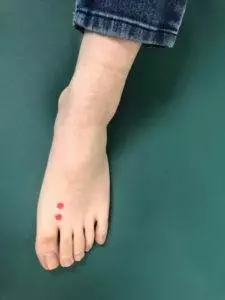
Acupuncture Near Me for Hepatitis in West LA
Chronic Hepatitis B and Hep C infections can be difficult to treat. Using acupuncture and herbs as an adjunct to conventional antiviral therapy for HBV may help to prevent further damage to the liver and improve organ function so that patients can recover from a chronic viral infection more fully. At Art of Wellness, we have over 30 years of experience providing integrative care for those suffering from chronic illnesses of all kinds.
*This article is for education from the perspective of Traditional Chinese Medicine only. The education provided by this article is not approved by FDA to diagnose, prevent, treat and cure human diseases. It should not stop you from consulting with your physician for your medical conditions. Traditional Chinese Medicine is based on Qi, which is an invisible force that usually cannot be observed by modern science. Because science focuses on testing ideas about the natural world with evidence obtained through observation, these aspects of acupuncture can’t be studied by science. Therefore acupuncture and Chinese herbs are often not supported by double-blind, randomized trials, and they are considered alternative medicine therapies in the United States.
How To Treat Dizziness With Acupuncture and TCM
By Qineng Tan, L.Ac., Ph.D. & Xiaomei Cai, L.Ac., Ph.D.

Feeling light-headed and dizzy? Maybe you feel like your head is spinning, or that the world is spinning around you? Headache, nausea, dizziness, and vertigo are symptoms that can be caused by a variety of health problems. Acupuncture and TCM offer vertigo treatment that can help relieve that sense of dizziness and nausea, or feeling light-headed and tired all the time.
Feeling dizzy is one the most common reasons that people go in for a doctor’s visit, or even visit the emergency room. Dizziness is a fairly general term that can mean anything from feeling light-headed, woozy, faint, off-balance, or unsteady to feeling nauseated or like you’re about to pass out.
Vertigo is a specific type of dizziness that refers to a sensation of spinning, as if the room around you is moving. You might feel like you’re leaning to one side, or about to fall over. It can make you feel sick to your stomach, similar to motion sickness. In popular culture, the word “vertigo” is sometimes used to mean a “fear of heights,” but that is actually called “acrophobia.” The sensation of vertigo can be triggered by looking down from above, or looking up at something very tall, but this is not the cause of most episodes of vertigo.
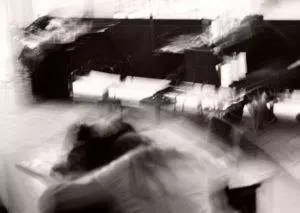
Vertigo causes include migraines and problems with the inner ear. The inner ear and eyes both relay information to the brain about a person’s spatial relation to the environment, so when the functioning of the eyes or ears is disrupted, it can cause a sense of imbalance, and even nausea. Migraine headaches, particularly a specific type called a vestibular migraine, can cause pressure in the head and dizziness and nausea.
Benign paroxysmal positional vertigo (BPPV) is one type of vertigo that causes short-term bouts of sudden dizziness. Benign positional vertigo is caused by the shifting of calcium crystals (canaliths) in the inner ear. This can happen due to a head injury or simply aging.
Other inner ear problems that can cause signs of vertigo include Meniere’s disease and Labyrinthitis. Meniere’s disease is a chronic disorder related to abnormal amounts of fluid (endolymph) collecting in the inner ear. The exact cause of Meniere’s is unknown, but it develops more frequently later in life. Meniere’s disease causes attacks of vertigo that can last from a few hours up to 24 hours. Like migraines with an aura, there is often a period of time during which a set of “warning symptoms” begin to occur, such as: a feeling of uneasiness, being off-balance, headache and dizziness, queasiness, hearing loss or ringing in the ears, or extra sensitivity to sound. Once an attack of vertigo hits, it can be quite severe, causing intense pressure in the ear, blurred vision, vomiting or diarrhea, cold sweats, rapid heart rate, and feelings of fear and panic. There is currently no cure for Meniere’s.
Labyrinthitis refers to inflammation of the small parts of the inner ear, or around the nerves of the inner ear that can be caused by viral or bacterial infections, such as: a flu, measles, herpes, hepatitis, Epstein-Barr, chicken pox, or childhood ear infections. Symptoms of labyrinthitis can include: dizziness, nausea, tinnitus (ringing in the ears), and difficulty concentrating.
Lightheadedness is a similar sensation to dizziness in some ways, but is usually caused by a sudden change in blood pressure or the flow of blood to the head. You have probably experienced feeling light headed and dizzy when you get up too fast from sitting or lying down. Other causes of lightheadedness include: allergies, anxiety, anemia, hyperventilating, arrhythmia, or heavy bleeding (as during menstruation).
Dizzy spells happen to everyone once in a while. But recurrent headache and dizziness should be addressed. Acupuncture and TCM have been used to help dizziness for thousands of years and offer natural solutions to the underlying causes of vertigo.
Top 10 Causes of Dizziness

Feeling light headed and dizzy, or having headache, nausea, dizziness, can occur as symptoms of a variety of imbalances. Reasons for dizziness may include:
- Inner ear imbalance, or labyrinthitis
- Meniere’s disease
- Sleep apnea, snoring
- Migraine – vestibular migraine
- Dehydration – alcohol, diuretics
- Sinus issues
- Ear infection
- Low Blood Sugar – diabetes, hypoglycemia
- Multiple Sclerosis (MS)
- Prescription Medication side effects
Dizzy spells that occur first thing in the morning are common for some people. This can be simply due to the change in pressure in the ear when you get out of bed. Waking up dizzy due to sleep apnea occurs because this condition obstructs your breathing during the night, and you may have lower oxygen levels when you wake up. Being dehydrated is another common cause of dizziness, which is exacerbated by drinking alcohol before bed. In general, drinking too much caffeine, too much alcohol, and not enough water, or taking diuretics can all lead to dizzy spells. Low blood sugar, whether due to diabetes, or simply not eating regularly enough, can also be a cause of light-headedness. Hepatitis, HBV, or HCV can also cause dizziness.
Postural orthostatic tachycardia syndrome (POTS) causes dizziness when moving from a seated or position or lying down to standing up.
Cervical vertigo, or cervicogenic dizziness, is another type of vertigo caused by the positioning of the neck or cervical spine; in this case, the feelings of imbalance and spinning may be accompanied by neck pain. This type of vertigo may happen, for instance, after a whiplash injury.
Treatment for Vertigo
The medical treatment for dizziness and vertigo depends wholly on the underlying causes for the symptoms. If a bacterial infection in the ear is confirmed, then antibiotics may be used. In cases of BPPV, a canalith repositioning procedure (CRP) is a non-invasive technique that can help the crystals within the inner ear move back into their proper place. Migraine-related vertigo may be treated with the medications typically prescribed for migraines. Anti-nausea drugs like Dramamine may be suggested. Patients suffering from cervical vertigo may be referred to physical therapy to help improve the positioning and strength of their neck/cervical spine.
Can Acupuncture Help Dizziness?
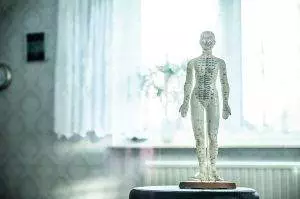
One of the central concepts of TCM is that of the root and the branches. The branches are the visible, outward signs or symptoms of a problem, while the root refers to what is going on deeper in the organ systems of the body. In the cases of dizziness and vertigo, there is deficiency in the root and excess in the branches.
Pathogenic factors involved in dizziness and vertigo are phlegm, wind, fire, and deficient Qi. When there is weakness in organs like the spleen, stomach, kidney, or heart, pathogens like wind, heat, and phlegm can take hold. The San Jiao, also known as the “triple burner,” is another important concept in TCM; one of its primary functions is to control the movements of fluids in the body so that they don’t collect and build up inappropriately. In case of vertigo, phlegm and heat develop to the point of causing stagnation and malfunctioning of the Jiao, pushing phlegm upwards in the body. An acupuncture practitioner will carefully listen and observe to discover which organ systems are out of balance, and work to strengthen those areas. For example, dizziness combined with emotional disturbances like anger and depression is a sign of too much wind or heat in the Liver. Weakness in the heart or spleen may follow a long illness or period of stress and anxiety. Too much phlegm, heat, and dampness in the stomach and spleen can result from an improper diet and too much stress.
Acupuncture and herbs to tonify these organs and clear heat and phlegm will take care of the root of the dizziness. Meanwhile, specific acupuncture points can have an almost immediate effect at relieving immediate discomfort, facilitating a natural vertigo cure.
A study conducted at a hospital in Taiwan used acupuncture to treat patients with dizziness and vertigo. The findings conclusively showed immediate improvement in symptoms.
A study of 60 patients who were admitted to an emergency room suffering from vertigo from a variety of causes, including Meniere’s and BPPV, showed that acupuncture treatment provided immediate relief of symptoms and is therefore a good alternative for dizziness due to various causes.
Top 5 Tips to Get Rid of Dizziness
Depending on the cause of the vertigo, there are different ways to manage with TCM techniques, including vertigo exercises, acupressure for dizziness, moxibustion, and foods to avoid.

Major 4 types of Vertigo/Dizziness presentation:
- Hypertension type – When a person has high blood pressure, too much liver yang, and is overheated, it can cause dizziness. For this, we use acupressure Liver points 2 and 3 on the toes.
- Qi and Blood deficiency – if a person shows signs of anemia, or has heavy periods, hemoglobin is low, or if a person has chronic conditions, or has suffered a major injury, or recently given birth, experienced major blood loss. For this we want to ensure a good diet with plenty of soups and easy to digest foods. Moxa on the back can help to strengthen the body’s Qi and produce enough blood. Qi Gong exercise of squeezing the earlobes and outer ear up and down is helpful.
- Kidney essence deficiency – this could be due to some constitutional weakness, or due to old age, or someone who tends to have chronic illness, diarrhea. The kidney essence can’t support rising essence to the head. For this, acupressure for Kidney 1 – on the bottom of the foot.
- Phlegm stagnation – when the middle jiao is not working due to stagnation of phlegm creating blockage so Qi cannot ascend. This happens when people are overweight, or have poor digestion, diarrhea. Avoid dairy and fried foods, which encourage phlegm. Moxibustion treatment to the back is helpful, and applying pressure to Stomach-36 acupressure point can help the middle jiao open up.
- Neck Pain – if a neck problem is causing a blockage, due to a neck disease or bulging disc, unhealthy cervical disks, compression, tension, and muscle spasms can block upwards energy. Exercises to encourage the health of the neck discs, loosen up the muscles and allow flow of Qi and blood up to the head. Your acupuncture practitioner will recommend neck exercises to help with this.
Acupuncture Near Me for Dizziness
Vertigo and dizziness may not be life-threatening symptoms, but they can have a big impact on your daily life. Frequently being blindsided by unexpected dizziness, spinning sensations, nausea, and headaches is unsettling and debilitating. Medications can be helpful in some cases, but they can also cause unwanted side effects. Getting to the root cause of vertigo with acupuncture and TCM will help get rid of dizzy spells so they don’t keep coming back.
*This article is for education from the perspective of Traditional Chinese Medicine only. The education provided by this article is not approved by FDA to diagnose, prevent, treat and cure human diseases. It should not stop you from consulting with your physician for your medical conditions. Traditional Chinese Medicine is based on Qi, which is an invisible force that usually cannot be observed by modern science. Because science focuses on testing ideas about the natural world with evidence obtained through observation, these aspects of acupuncture can’t be studied by science. Therefore acupuncture and Chinese herbs are often not supported by double-blind, randomized trials, and they are considered alternative medicine therapies in the United States.
How to Treat Bloated Stomach With Acupuncture and TCM
By Xiaomei Cai, L.Ac,. Ph.D. & Qineng Tan, L.Ac., Ph.D.
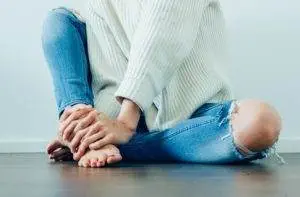
Do you feel constantly gassy or have a bloated stomach after eating? Digestive problems like gastritis or colitis can cause abdominal bloat. Stress and hormonal imbalances can also contribute to inflammation and bloated stomach pain. Acupuncture and TCM herbs can help improve digestion and relieve abdominal bloating.
Abdominal bloating occurs when gas builds up in the gastrointestinal tract, filling the stomach and/or intestines with air. This can cause the belly area to get swollen and distended. Bloating can cause an inflated belly, sharp pain in the abdomen, belching and flatulence, nausea, or a sudden strong urge to go to the bathroom. Bloating can be related to fluid retention; this is sometimes called “water bloat.”
Problems with digestion that lead to a feeling of heaviness, “like a rock” in your belly after eating, are common. People who have been diagnosed with some type of functional gastro-intestinal disorder (FGID)–like irritable bowel syndrome (IBS) or dyspepsia (indigestion)–are extremely likely to experience abdominal pain and bloating after eating, while up to 30% of all people report having bloating at least some of the time. Inflammation in the walls of the stomach (gastritis) or intestine (ulcerative colitis) can also cause bloating.
Women often feel bloated before or during their menstrual period, and female reproductive disorders like endometriosis, fibroids (leiomyoma of the uterus), and PCOS (polycystic ovarian syndrome) can cause abdominal pain and bloating.
FGIDs can be very hard to manage; it may be difficult to get a clear diagnosis or effective medical treatment. Problems like constipation, diarrhea, nausea, abdominal pain and bloating are highly subjective, and people are often made to feel like it’s normal to have these issues, or that all they need to do is avoid certain foods.
Feelings of anxiety and depression are common among people who suffer from moderate to severe bloating on a regular basis. This can become a vicious cycle, as the pain and swelling of the abdomen causes anxiety, and the physiological effects of the emotional stress trigger the bloating to happen again and again. Sometimes people dread eating meals because they are so afraid of the painful and embarrassing bloated stomach.
Digestive upsets are complex to treat because there can be many factors contributing to the discomfort. So many different conditions can cause bloating, it can be hard to get a clear handle on the true cause. This is a case when TCM methods of diagnosis offer many advantages, because a TCM practitioner will be able to study the whole picture presented by a patient and pinpoint what underlying conditions are causing gas and distension. Acupuncture and herbs can help resolve abdominal bloating and other symptoms at their root source.
Top 10 Abdominal Bloating Causes

Why might someone feel bloated and gassy all the time? Many different types of gastrointestinal disorders can contribute to a bloated belly and excess gas, as can hormonal and emotional changes. What causes abdominal bloating can be one issue or a combination of factors:
- Irritable Bowel Syndrome (IBS)
- Inflammatory bowel disease, Ulcerative colitis or Crohn’s Disease
- Gastritis, stomach ulcers, inflammation of the stomach
- Food intolerance, gluten intolerance, celiac disease
- PMS, menstruation
- Stress, anxiety, depression
- Pregnancy
- Constipation
- Liver disease
- Abdominal adhesions, or scar tissue from surgeries
Eating behaviors like eating too quickly, swallowing air while eating, or eating fiber-rich foods that cause gas like beans, can lead to bloating. Drinking a lot of carbonated beverages can lead to excess gas in the GI tract. Smoking can also be a factor. Some medications can cause bloating as a side effect, including antibiotics, oral birth control pills, opioid pain medications, medicines to relieve constipation, and even some supplements, like iron pills.
Cancers of the abdominal organs, such as ovarian cancer, stomach cancer, colon cancer, or pancreatic cancer, can also cause bloating in the belly. Gallstones or gallbladder disease, gastroparesis, kidney problems, and liver problems can all cause stomach pain and bloating.
Medical Treatment for Abdominal Bloating
Many people do not seek medical help for bloating, trying to manage it on their own with over the counter medications that promise relief from gas pain and acid reflux. Antacids only help with the kind of bloating that is caused by food, though; they don’t help with bloating related to FGIDs, hormones, or emotional stress. When a person does ask their primary care doctor or even a gastroenterologist for help with bloating, they may find that the treatment options are very limited. Doctors will usually reassure patients that gas and bloating, while uncomfortable, are not actually dangerous. Then, they will often advise that patients go on a strict elimination diet, cutting out wheat, dairy, and most vegetables and legumes. Sometimes doctors will prescribe antibiotics to alter the balance of gut bacteria. Antidepressants are sometimes prescribed to help with bloating. Conventional medical science still has a ways to go to fully understand the underlying causes of digestive problems like bloating.
Because bloating is not viewed as a disorder in and of itself, not much serious research has been done to show what types of treatments work best to get rid of bloating. TCM treatment has been shown in a randomized controlled trial, a peer-reviewed study, and a hospital-based investigation to help in relieving stomach pain due to chronic gastritis.
How Can Acupuncture Help With Bloating?
TCM offers a multidisciplinary approach to the digestive problems, hormone imbalances, and emotional upsets that can cause bloating. An experienced acupuncturist is able to use methods of diagnosis such as studying the appearance of the tongue, feeling the pulse, and asking lots of questions about how and when the symptoms occur to find the specific pattern of imbalance that is causing gastric distress.
Different presentations of digestive conditions that may cause abdominal bloating and pain include:
- Spleen/Stomach Deficiency – characterized by symptoms: chronic bloating, poor appetite, feel worse after eating, pallor, and fatigue. This type of bloating can be caused by antibiotics, too much raw or fermented food, eating disorders, a long period of illness, or chronic inflammatory disorders.
- Damp-Phlegm – symptoms include: distended stomach, nausea, acid reflux, diarrhea. This type of bloating can be caused by dietary habits that include excess sugar, alcohol, fatty or fried foods, and dairy products. Can also be related to damp environmental conditions.
- Liver Qi stagnation – common symptoms are: stomachaches, stomach gurgling, belching, and constipation. This type of bloating can be caused by stress, feelings of anxiety or anger, and irregular, emotional eating behaviors.
TCM treatment for abdominal bloating will use acupuncture and herbs to bring the stomach and liver back into harmonious function, clearing phlegm and improving digestion. Treatment will be individualized based on the underlying causes of the imbalance; if reproductive hormones are involved, then that factor will be taken into consideration when preparing the herbal formula. If mental health issues are a factor, specific points will be added to help relieve anxiety. Naturally, your acupuncturist will have some clear instructions on how to optimize your nutrition to reduce bloating.
Top 5 Tips for How to Stop Bloating

While bloating may be caused by all sorts of different factors, there is no doubt that making some changes to your eating habits will probably have an impact on how bloated you feel. What helps bloating may be different for each person’s constitution or lifestyle, so it will be very helpful to have an in-depth conversation with your acupuncture provider about what bloating diet is best for you.
- Chew your food thoroughly. Many people eat fast, and don’t pay much attention to chewing their food well before they swallow. Food is really meant to be broken down and mixed with saliva in the mouth before it moves down the esophagus and into the stomach. Skipping this important step by swallowing half-chewed food means that your stomach has to produce more acid and work much harder to digest the food before it moves deeper into your gastrointestinal tract. Eating too quickly can also easily lead to eating more than you need. It takes about 20 minutes for your brain to receive the message that the stomach is full. Chew slowly, and enjoy every bite; this will improve your digestion.
- Avoid icy cold drinks and foods. Cold liquids are shocking and unfriendly to your internal organs, both those of the digestive tract and the female reproductive organs. Constantly drinking ice-cold beverages irritates the smooth muscle tissues of the stomach, intestines, and uterus. Drink more warm liquids, which are soothing to these organs.
- Ginger tea – many of our herbal formulations include slices of fresh ginger to help soothe the stomach and GI tract. Ginger helps the body to produce more of the digestive enzymes that work to break down food, and relieves cramping in the belly. All you need to do is keep a knob of fresh ginger on hand, cut two or three slices and steep in hot water as you would a teabag. Sip anytime, but especially before meals, to help relieve gastritis pain and bloating.
- Choose foods in harmony with the season. Raw foods are appropriate in the summer, but in the winter, it’s better to eat cooked foods. Eating more bitter-tasting foods, like dark leafy greens, helps the liver and kidneys.
- Use acupressure to help relieve bloating and gassiness. Acupoints are located along the meridians and correspond to various organ systems. Applying gentle, steady, downward pressure to acupoint ST36 (Zu San Li), which is associated with the stomach, can help to relieve bloating, stomach pain, nausea, and feelings of stress. ST36 is located on the outer edge of the shin bone, about 4 finger widths beneath the kneecap.
Acupuncture Near Me for Abdominal Bloating
TCM offers a holistic approach to digestive problems of all kinds. Symptoms like abdominal bloating, stomach pain, and gassiness are usually signs that there is a deeper problem. If you haven’t been able to solve the problem of bloating with conventional medicine or dietary changes, you may be able to get help for digestive difficulties with acupuncture and herbs.
*This article is for education from the perspective of Traditional Chinese Medicine only. The education provided by this article is not approved by FDA to diagnose, prevent, treat and cure human diseases. It should not stop you from consulting with your physician for your medical conditions. Traditional Chinese Medicine is based on Qi, which is an invisible force that usually cannot be observed by modern science. Because science focuses on testing ideas about the natural world with evidence obtained through observation, these aspects of acupuncture can’t be studied by science. Therefore acupuncture and Chinese herbs are often not supported by double-blind, randomized trials, and they are considered alternative medicine therapies in the United States.
